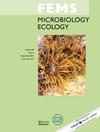通过 eDNA 代谢编码揭示冰川融化季节北极峡湾浮游植物与异养菌之间的相互作用
IF 3.2
3区 生物学
Q2 MICROBIOLOGY
引用次数: 0
摘要
斯瓦尔巴峡湾的水文变化对水质特性有很大影响,导致表层和次表层之间的微生物多样性和群落组成模式截然不同。然而,对浮游植物相关细菌群落的调查却很有限,而这些细菌群落对北极峡湾生态系统的运作至关重要。本研究通过对 16S 和 18S rRNA 基因进行全面的 eDNA 代谢编码,研究了斯瓦尔巴特峡湾水域浮游植物与异养细菌群落之间的相互作用。16S rRNA 测序结果显示,整个峡湾水域的群落组成较为单一,包括少数优势异养细菌,而 18S rRNA 测序结果则表明浮游真核生物在空间上分布多样。异养细菌的相对丰度呈深度分布。相比之下,主要浮游植物种群在表层水域的分布则各不相同。在网络模型中,浮游植物(原生植物门和二叶植物门)与异养细菌(尤其是放线菌)的联系表明,细菌对浮游植物产生的有机物的归宿有直接或间接的影响。我们对与浮游植物产生的有机物有关的细菌活动代谢途径的预测表明,浮游植物与异养细菌之间存在竞争优势和共生关系。我们的研究结果为了解浮游植物与细菌之间的相互作用对北极峡湾环境变化的响应提供了宝贵的见解。本文章由计算机程序翻译,如有差异,请以英文原文为准。
Interaction between phytoplankton and heterotrophic bacteria in Arctic fjords during glacial melting season as revealed by eDNA metabarcoding
The hydrographic variability in the fjords of Svalbard significantly influences water mass properties, causing distinct patterns of microbial diversity and community composition between surface and subsurface layers. However, surveys on the phytoplankton-associated bacterial communities, pivotal to ecosystem functioning in Arctic fjords, are limited. This study investigated the interactions between phytoplankton and heterotrophic bacterial communities in Svalbard fjord waters through comprehensive eDNA metabarcoding with 16S and 18S rRNA genes. The 16S rRNA sequencing results revealed a homogenous community composition including a few dominant heterotrophic bacteria across fjord waters, whereas 18S rRNA results suggested a spatially diverse eukaryotic plankton distribution. The relative abundances of heterotrophic bacteria showed a depth-wise distribution. In contrast, the dominant phytoplankton populations exhibited variable distributions in surface waters. In the network model, the linkage of phytoplankton (Prasinophytae and Dinophyceae) to heterotrophic bacteria, particularly Actinobacteria, suggested the direct or indirect influence of bacterial contributions on the fate of phytoplankton-derived organic matter. Our prediction of the metabolic pathways for bacterial activity related to phytoplankton-derived organic matter suggested competitive advantages and symbiotic relationships between phytoplankton and heterotrophic bacteria. Our findings provide valuable insights into the response of phytoplankton-bacterial interactions to environmental changes in Arctic fjords.
求助全文
通过发布文献求助,成功后即可免费获取论文全文。
去求助
来源期刊

FEMS microbiology ecology
生物-微生物学
CiteScore
7.50
自引率
2.40%
发文量
132
审稿时长
3 months
期刊介绍:
FEMS Microbiology Ecology aims to ensure efficient publication of high-quality papers that are original and provide a significant contribution to the understanding of microbial ecology. The journal contains Research Articles and MiniReviews on fundamental aspects of the ecology of microorganisms in natural soil, aquatic and atmospheric habitats, including extreme environments, and in artificial or managed environments. Research papers on pure cultures and in the areas of plant pathology and medical, food or veterinary microbiology will be published where they provide valuable generic information on microbial ecology. Papers can deal with culturable and non-culturable forms of any type of microorganism: bacteria, archaea, filamentous fungi, yeasts, protozoa, cyanobacteria, algae or viruses. In addition, the journal will publish Perspectives, Current Opinion and Controversy Articles, Commentaries and Letters to the Editor on topical issues in microbial ecology.
- Application of ecological theory to microbial ecology
- Interactions and signalling between microorganisms and with plants and animals
- Interactions between microorganisms and their physicochemical enviornment
- Microbial aspects of biogeochemical cycles and processes
- Microbial community ecology
- Phylogenetic and functional diversity of microbial communities
- Evolutionary biology of microorganisms
 求助内容:
求助内容: 应助结果提醒方式:
应助结果提醒方式:


